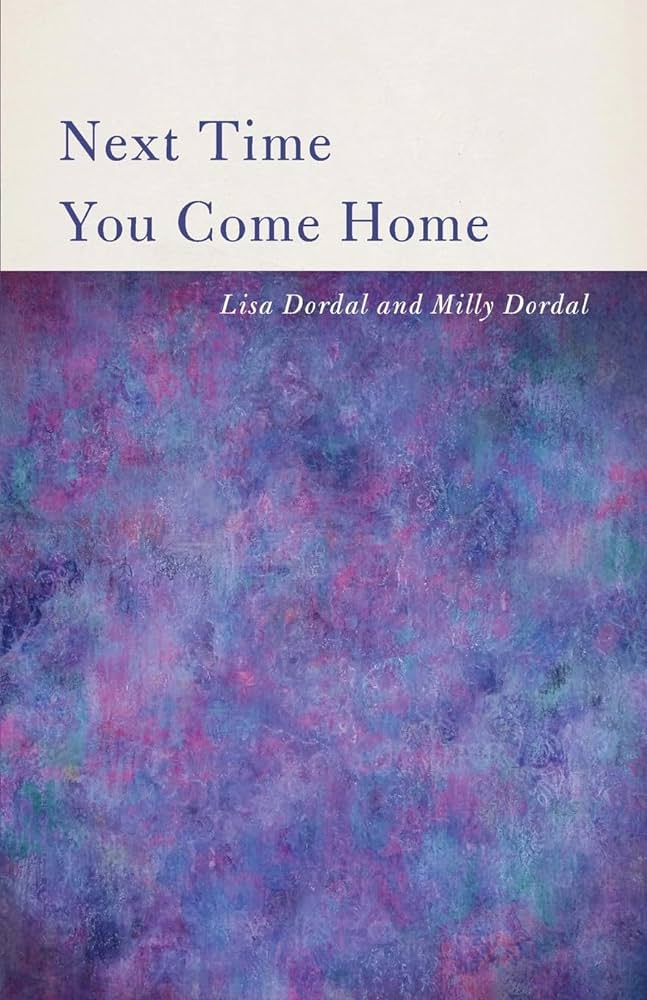Review of Next Time You Come Home by Lisa Dordal and Milly Dordal

Next Time You Come Home
Lisa Dordal and Milly Dordal
Black Lawrence Press, 2023, 120 pages
$19.95
Reviewed by Yeva Johnson
Next Time You Come Home by Lisa Dordal and Milly Dordal is a beautiful collection that transforms a mother and daughter’s correspondence into a lyrical tour de force on grief and connection while spotlighting big and tender moments of the last part of the twentieth century. The beautiful cover artwork subtly reinforces the layers of meaning within many of the poems.
Next Time You Come Home is organized in two parts. Part I serves as a contextualizing introduction to the poems that follow, which are based on letters from Lisa’s mother that Lisa rediscovers twenty years after Milly’s death. The reader is informed that Milly was an alcoholic who had experienced multiple losses due to life’s vicissitudes. Milly and Lisa corresponded extensively in the 1980s and 1990s so that Milly’s habit of writing the date and time of each letter shines a new light, showing that the daytime mother, who was a respected community leader, and the nighttime mother, under the influence of alcohol, were more closely related than Lisa realized. In the process of typing up Milly Dordal’s letters, Lisa Dordal performed what she described as “a sculpting exercise” and a “distillation process” to transform her mother’s written communication into a poetic form between letters and poems that elucidate the themes she shares with us—including the natural world, grief and loss, racism, sexism, and substance use disorders—while also capturing her mother’s voice so that we, too, can meet this complex woman who sacrificed her dream of being a writer to raise four children.
Part II, called “Not This, Not That,” comprises the letters as poems. All the poem titles refer simply to the month and year they were originally composed, as Lisa has already prepared us for the gaps in the letters that serve as a “lovely metaphor for” her “relationship with and understanding of” her mother. The poems cover the time period during and after Lisa came out to her mother as a lesbian, so that lines such as “I would be delighted if, someday, you had a special friend, / and we could meet her” from March of 1996 demonstrate the tender way a mother shows her love for her queer daughter. Lisa deftly carries on her mother’s quirky sense of humor with lines like “How are your plants doing? / Mine are experiencing strange deaths” and “It rained many inches on Friday and Saturday – / if it had been snow, it would have been awful. / Instead it was only depressing.” One wonders if Milly intended a joke with “Play Reading is tonight: Awake and Sing by Clifford Odets. / It’s about a dysfunctional family. Dad has a role”.
Lisa privileges readers with a view of this intimate relationship that overlapped by the thirty-six years while they were both alive in lines like “…You were 10 when I started drinking, / maybe 9. I’ve put you through a lot of pain” and “Draw me a picture of your Oak chairs, so I can picture you / sitting, writing, reading in them –.” Milly and Lisa Dordal share their blend of letter poems with everyday life details that make them relatable to readers today, such as when they write, “we should be able to have a good time – / if we avoid discussing politics or evolution. / Maybe we can reminisce about the 50s” and “I’m sure the cookies will be crumbs, / but they were sent with love.” There are many other poems and many lines that are a pleasure to read and can be savored again and again.
Lisa Dordal honored her mother by making her a coauthor of the collection. These lines from a February 1990 poem sum up my admiration for this collection and this mother-daughter poetry duo: “I love the ‘Broken Pitcher’ notecard you sent. / The woman in the painting reminds me of you (and me).” Make Next Time You Come Home a part of your poetry library for a ready source of comfort and a reflection on love and loss.
Yeva Johnson, a Pushcart Prize-nominated poet and musician whose work appears in Bellingham Review, Essential Truths: The Bay Area in Color Anthology, Sinister Wisdom, Yemassee, and elsewhere, explores interlocking caste systems and possibilities for human co-existence in our biosphere. Her debut poetry chapbook, Analog Poet Blues, is available at Black Lawrence Press.
Disclosure: Nomadic Press published Yeva Johnson’s debut chapbook, Analog Poet Blues, in 2023; Nomadic Press stopped operations the same month that Analog Poet Blues was released. Black Lawrence Press is now the publisher of Analog Poet Blues. The review author, Yeva Johnson, is also published by the publisher of Lisa Dordal’s book.
"Empowerment comes from ideas."
― Charlene Carruthers
"Your silence will not protect you."
— Tourmaline
"Gender is the poetry each of us makes out of the language we are taught."
— Leila Raven


